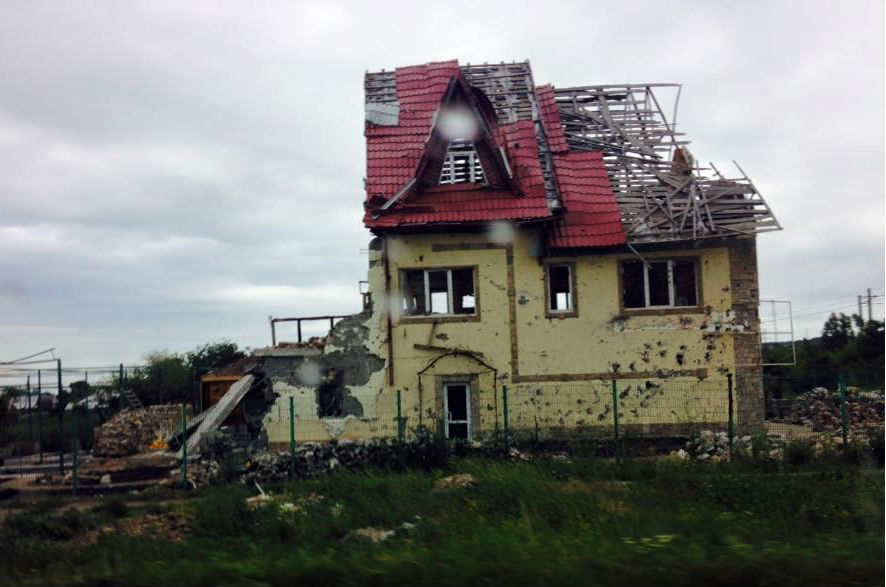 In many respects, Ukraine is unrecognizable from the place it was a mere two years ago. Civic engagement has clearly increased, as seen by the remarkable mobilization of volunteers, flourishing of local civic groups, and generous donations for a variety of causes. A sense of vitality and energy pervades the country—unlike a few years ago, when the prevailing mood was one of dour resignation tinged with seething rage. The level of discontent with former President Viktor Yanukovych and his abuse of power—demonstrating a flagrant disdain for Ukraine’s citizens and disregard for its national interests—finally boiled over in November 2013.
In many respects, Ukraine is unrecognizable from the place it was a mere two years ago. Civic engagement has clearly increased, as seen by the remarkable mobilization of volunteers, flourishing of local civic groups, and generous donations for a variety of causes. A sense of vitality and energy pervades the country—unlike a few years ago, when the prevailing mood was one of dour resignation tinged with seething rage. The level of discontent with former President Viktor Yanukovych and his abuse of power—demonstrating a flagrant disdain for Ukraine’s citizens and disregard for its national interests—finally boiled over in November 2013.
The Maidan protests united Ukraine’s citizens to an unprecedented degree. This sense of unity reached well beyond Kyiv, resonating in the country’s more remote regions. Russia’s annexation of Crimea and incursion into the Donbas helped galvanize society with a sense of common purpose. Coupled with strong public support for deep and fundamental reforms, the Ukrainian government enjoys an unparalleled mandate to move the country out of its decades-long rut.
Besides passing and implementing a series of difficult reforms, the government must also safeguard national integrity in the face of ongoing fighting in eastern Ukraine. The war has displaced more than 1.4 million people and wounded thousands of soldiers, leading to uncertainty in regions bordering the conflict zone and strains on the social fabric that are completely new to Ukraine. Yet, these formidable hurdles also offer a chance for Ukraine to emerge stronger and in a better position to navigate future difficulties. But first, the country must overcome the traditional divide that separates Kyiv from the rest of Ukraine. This is as true for politicians and other authorities as it is for Kyiv-based elites and activists.
Disenfranchisement, and its subsequent political apathy, have contributed heavily to Ukraine’s current state. The lack of responsive and responsible government, along with a corrupt judicial system, left a society that has learned to fend for itself and feels little loyalty to the state or its institutions. But this must change for the country to move forward.
First, the government must make an effort to reach out and engage citizens. Historically, elites tend not to spend much time outside of Kyiv or select oblast capitals. It is clear the government lacks an effective communication strategy. While television is certainly the media of choice for most Ukrainians—particularly in outlying regions—it is somewhat limited. In rural Luhansk and Donetsk, many houses sport satellite dishes their roofs, though it’s doubtful their occupants are tuned into Ukrainian state TV.
Though press conferences have helped somewhat, there is little understanding of, and thus little attention paid to, the concerns of the majority of Ukrainians living outside the capital. That’s because politicians who regularly call on Western capitals rarely venture out to places like Severodonetsk or engage local inhabitants. Those who do might be surprised to see the actual living conditions of many of the 45 million Ukrainians they claim to represent. This continuing neglect and disdain for voters poses a potentially serious threat to the country’s stability, yet the authorities can easily avert this threat with a little political goodwill and common sense.
Decentralization offers the best opportunity for Ukraine to ensure the continued engagement of a broad range of citizens. This reform, which has been delayed for too long, will help break corrupt vertical power structures while enfranchising Ukraine’s citizens. It is unfortunate that such a widely demanded and anticipated reform may fail because it is associated with the unpopular Minsk II agreement and amateur procedural irregularities. Decentralization devolves both power and responsibility to the local level, fulfilling the public demand for greater government accountability and transparency. Citizens are more likely to feel vested in the state when they can exert control over local affairs.
Ukraine faces the greatest challenges, but also has the greatest opportunities in its history as an independent nation. Much depends on Kyiv showing that it has understood the lessons of the Maidan. But time is running out, and the onus is on Ukraine’s leaders to demonstrate some statesmanship by not repeating the mistakes of their predecessors.
Joanna Rohozinska is Senior Program Officer for Europe and Eurasia at the National Endowment for Democracy. The views expressed are those of the author and do not necessarily represent those of the National Endowment for Democracy.
Image: A destroyed building on the road outside of Slovyansk, Ukraine. The city was one of the focal points in the early stages of the war in eastern Ukraine, but was retaken by Ukrainian forces in July 2014. Credit: Joanna Rohozinska
